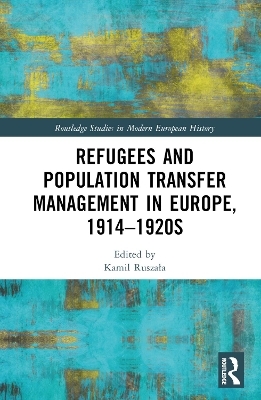
Refugees and Population Transfer Management in Europe, 1914–1920s
Routledge (Verlag)
978-1-032-75162-7 (ISBN)
This book provides a comprehensive study of refugee movements and population transfers across Europe during the First World War and the early postwar period.
Drawing parallels with contemporary migration issues, the book serves a social and educational purpose by highlighting Europe's history of migration and emphasizing the relevance of past experiences to current challenges. It seeks to enhance understanding, raise social awareness, and contribute to the broader discourse on war refugeeism by applying historical insights to address contemporary migration crises.
The authors discuss how issues of refugee movements and population transfers were addressed in different contexts and reflect on refugees as both war-induced migrants and political tools for authorities. The book covers a range of topics including humanitarian systems during the war and the early postwar period, refugee locations, policy influence, national issues, self-organization, and aid for refugees, as well as immigration control in time after bordering the postimperial Europe. It also addresses the composition of populations in postwar reconstruction processes and its population dynamics.
This volume will be of value to those interested in modern European history, social and political history.
Kamil Ruszała is Assistant Professor in Modern History at Jagiellonian University, specializing in East Central Europe in the 19th to 20th centuries, with a particular focus on the Habsburg Empire, the First World War, post-imperial transformation, refugees and migrants, as well as war commemoration and heritage.
PART 1: Refugees and (post)war migrants as lessons from the past
1. War refugees: an Endless Journey? Lessons from the past and present
Kamil Ruszała
2. Refugees in the Greater War: still a long way to go?
Peter Gatrell
PART 2: State Control, Political Tool and Refugees
3. “Under such extraordinary circumstances”: the Norwegian state’s attempt at defining and controlling refugees and migrants during the First World War
Eirik Brazier, Nik Brandal
4. Refugees as a “political tool”: the propaganda of the “Prokuden zemedelec” and “Osvoboždenie” newspapers (1920–1923)
Tsvetelina Tsvetkova
PART 3: Refugee Camps and Beyond
5. National mobilization, humanitarian agency from Below, and wartime authorities: Polish refugees from Galicia in Salzburg during the First World War
Kamil Ruszała
6. The others: refugees seen from the Slovenian perspective of the First World War
Gregor Antoličič, Petra Svoljšak
7. “National consciousness and honor are not betrayed anywhere”: the organization and self-organization of Ukrainian refugees in Gmünd camp (1915–1918)
Iryna Orlevych, Nataliia Kolb
8. Rumors, imperial “humanitarianism” and the destruction of the Armenian refugee camps in Syria and Lebanon, 1918–1926
Victoria Abrahamyan
PART 4: Refugees and humanitarianism
9. Civic humanitarianism: Glasgow, the Great War and Belgian refugees
Kieran Taylor
10. Non-governmental assistance to Latvian refugees after 1918: the involvement of the Latvian diaspora
Kristine Bekere
PART 5: Postwar Population Order
11. Population changes in Latvia 1914–1920: the refugee factor
Eriks Jekabsons
12. (Regular) Immigration Controls in the Interwar (Semi-)Periphery? East-Central- and Southeast European Policy Patterns, 1918–1928
Aleksandar R. Miletić
13. Where did they come from? The composition of the Polish population in 1921 as a result of war-related migratory movement
Bartosz Ogórek
14. Statelessness and the limits of national sovereignty. German and Russian refugees in the early Weimar Republic
Anna Mashi
| Erscheinungsdatum | 25.07.2024 |
|---|---|
| Reihe/Serie | Routledge Studies in Modern European History |
| Zusatzinfo | 5 Tables, black and white; 9 Line drawings, color; 2 Line drawings, black and white; 7 Halftones, black and white; 9 Illustrations, color; 9 Illustrations, black and white |
| Verlagsort | London |
| Sprache | englisch |
| Maße | 156 x 234 mm |
| Gewicht | 810 g |
| Themenwelt | Geschichte ► Allgemeine Geschichte ► Neuzeit (bis 1918) |
| Geisteswissenschaften ► Geschichte ► Regional- / Ländergeschichte | |
| Sozialwissenschaften ► Politik / Verwaltung | |
| Sozialwissenschaften ► Soziologie ► Empirische Sozialforschung | |
| ISBN-10 | 1-032-75162-2 / 1032751622 |
| ISBN-13 | 978-1-032-75162-7 / 9781032751627 |
| Zustand | Neuware |
| Haben Sie eine Frage zum Produkt? |
aus dem Bereich


